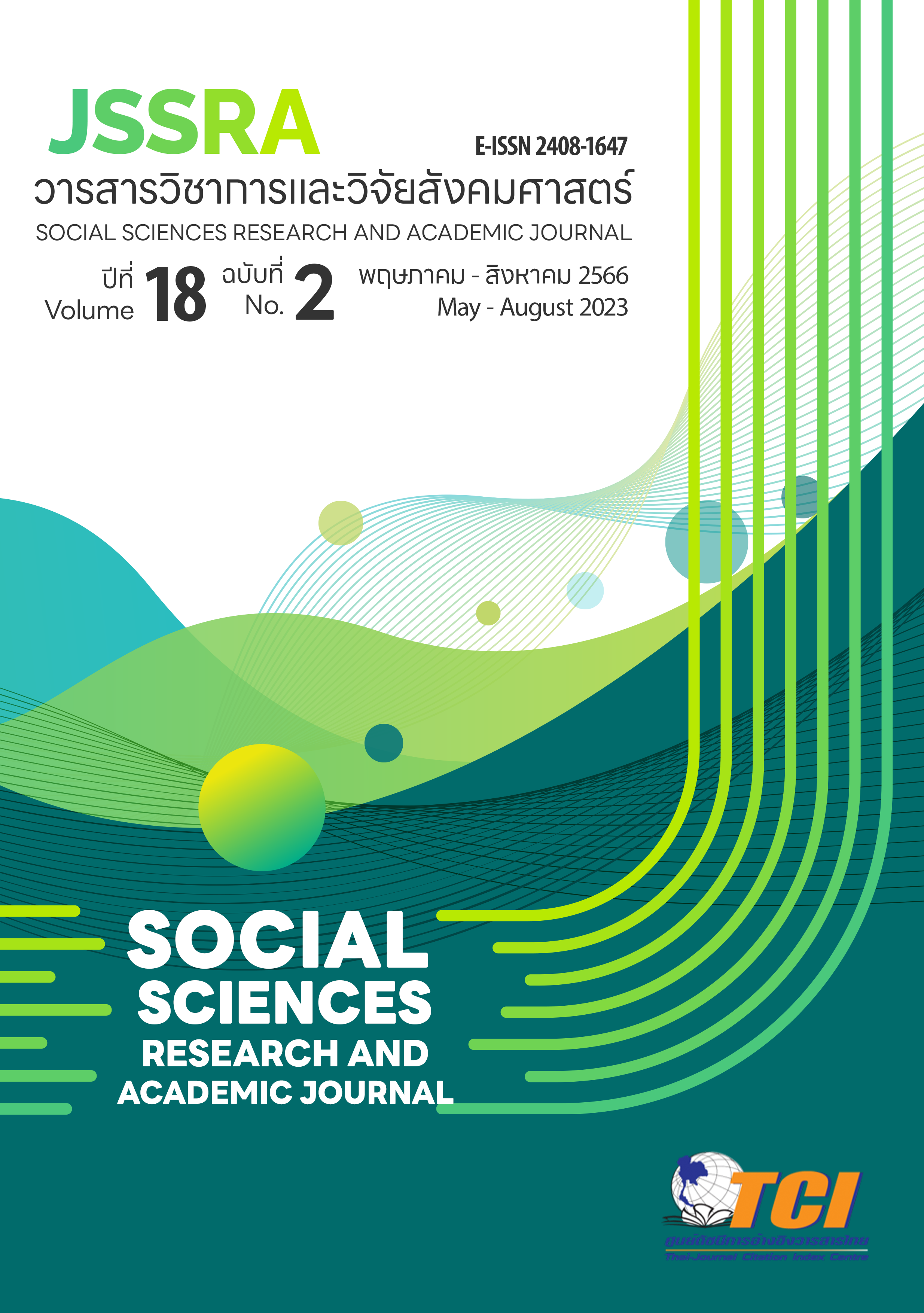การพัฒนารูปแบบเสริมสร้างสมรรถนะครูด้านการจัดการเรียนรู้วิทยาศาสตร์ เชิงสร้างสรรค์และผลิตภาพตามทฤษฎีสร้างสรรค์ความรู้ผ่านชิ้นงาน ร่วมกับแนวคิดการเสริมต่อความรู้ The Development of A Model for Enhancing Teachers Competency in Science Learning Management with Creativity and Productivity Based Using Constructionism Theory Together with Scaffolding Approach
Main Article Content
Abstract
This research aimed to develop a model for enhancing teachers’ competency in science learning management with creativity and productivity based on using constructionism theory together with scaffolding approach. There were 4 research steps. Step 1 was studying information about teachers’ competency in science learning management with creativity and productivity. Step 2 was creating and examining the quality of the model for enhancing teachers’ competency. Step 3 was studying the results of using this model. Step 4 was evaluating the model by inputs, processes and outputs. The target group who were 18 elementary school science teachers under the Nan Primary Education Service Area Office1.The data were analyzed by using percentage, mean, standard deviation, and t-test.
The findings are as follows. 1)The results of studying the competency of science learning management with creativity and productivity showed that the competency in science learning management with creativity and productivity was, overall, at a high level (= 3.65, S.D. = 0.66). 2) The results of creating and examining the quality of the model for enhancing teachers’ competency in science learning management with creativity and productivity consisted of 1) principles, 2)goals, 3) contents, 4) development process, and 5) measurement and evaluation. The model was at a high level (
= 4.48, S.D. = 0.48) and had an effectiveness index of 53.02%. 3) The teachers had knowledge and understanding after using this model were significantly higher than before, at the .05 level. The teachers' ability to write a learning management plan of the teachers after the development was 79.37%, and manage learning activities was 82.28%, higher than the 70% standard criteria, which was statistically significant at the .05 level. Additionally, the teachers had a positive attitude towards science learning management with creativity and productivity higher than before the development, which was statistically significant at the .05 level. 4. Results of the evaluation for the model showed that the opinions towards this model were at a high level (
= 4.41, S.D. =0.62).
Article Details
References
จิรันธนิน คงจีน. (2560). การพัฒนารูปแบบการจัดการเรียนรู้วิทยาศาสตร์ตามแนวการเรียนรู้อย่าง
กระตือรือร้นและการช่วยเสริมศักยภาพ เพื่อส่งเสริมความสามารถในการแก้ปัญหาอย่างมีวิจารณญาณ สำหรับนักเรียนชั้นมัธยมศึกษาตอนปลาย. วิทยานิพนธ์ดุษฎีบัณฑิต สาขาหลักสูตรและการสอน. มหาวิทยาลัยนเรศวร, พิษณุโลก.
ชาญณรงค์ วิเศษสัตย์. (2562). การพัฒนารูปแบบการเรียนรู้ส่งเสริมทักษะการคิดเชิงนวัตกรรม
ของนักศึกษาวิชาชีพครู. วิทยานิพนธ์ดุษฎีบัณฑิต สาขาหลักสูตรและการสอน. มหาวิทยาลัยมหาสารคาม, มหาสารคาม.
ทวีศักดิ์ จินดานุรักษ์. (2560). ครูและนักเรียนในยุคการศึกษาไทย 4.0. วารสารอิเล็กทรอนิกส์การเรียนรู้
ทางไกลเชิงนวัตกรรม, 7(2), 14-28.
ทิพวรรณ สุวรรณ. (2557). การพัฒนาหลักสูตรเสริมสร้างความสามารถในการจัดการเรียนรู้โครงงาน
วิทยาศาสตร์สำหรับครูวิทยาศาสตร์ระดับมัธยมศึกษาตอนต้น. วิทยานิพนธ์ดุษฎีบัณฑิต สาขาหลักสูตรและการสอน. มหาวิทยาลัยนเรศวร, พิษณุโลก.
ทิศนา แขมมณี. (2561). ศาสตร์การสอนองค์ความรู้เพื่อการจัดกระบวนการเรียนรู้ที่มีประสิทธิภาพ.
(พิมพ์ครั้งที่ 22). กรุงเทพฯ: สำนักพิมพ์จุฬาลงกรณ์มหาวิทยาลัย.
ประเวศน์ มหารัตน์สกุล. (2556). การจัดการและพัฒนาทรัพยากรมนุษย์. กรุงเทพฯ: ปัญญาชน.
พชรวิทย์ จันทร์ศิริสิร. (2554). การพัฒนาสมรรถนะทางการบริหาร. มหาสารคาม: สำนักพิมพ์
มหาวิทยาลัยมหาสารคาม.
ไพฑูรย์ สินลารัตน์. (2559). ปรัชญาการศึกษาเชิงสร้างสรรค์และผลิตภาพ. กรุงเทพฯ: โรงพิมพ์แห่ง
จุฬาลงกรณ์มหาวิทยาลัย.
วรัตถ์พัชร์ ทวีเจริญกิจ. (2561). การพัฒนารูปแบบการเรียนการสอนเพื่อส่งเสริมทักษะในการคิดแก้ปัญหา
ของนักเรียนอาชีวศึกษาตามแนวคิดทฤษฎีการสร้างความรู้. วิทยานิพนธ์ดุษฎีบัณฑิต สาขาหลักสูตรและการสอน. มหาวิทยาลัยบูรพา, ชลบุรี.
สํานักงานเลขาธิการสภาการศึกษา. (2558). รายงานผลการศึกษาสถานภาพการผลิตและพัฒนาครูใน
ประเทศไทย.สำนักวิจัยและพัฒนาการศึกษา, กรุงเทพฯ.
สุระศักดิ์ เมาเทือก. (2560). การพัฒนาสมรรถนะครูวิทยาศาสตร์ในการจัดการเรียนการสอนเพื่อ
ส่งเสริมการรู้เรื่องวิทยาศาสตร์ของนักเรียน. สาขาการวิจัยและพัฒนาการศึกษา คณะศึกษาศาสตร์ มหาวิทยาลัยเชียงใหม่, เชียงใหม่.
Papert, S. (1999). Introduction: What is Logo? And Who Need It? In Logo. Philosophy and
Implementation. LCSI.
Puntambekar Sadhana and Roland Hübscher. (2005). Tools for Scaffolding Students in a Complex
Learning Environment: What Have We Gained and What Have We Missed?. Journal in Educational Psychologist June 2010, 40(1), 1–12.
Senge, P. M. (1990). The fifth discipline:The art and practice of the learning organization.
London: Century Press.
Tina Chasely. (2019). Using scaffolding to support preservice teachers pedagogical reasoning and
adaptive metacognition in reflection. Dissertation submitted in Partial fulfillment of the Requirements for the Degree of Doctor of philosophy in Curriculum and Instruction . Northern Arizona University.
Vygotsky, L.S. (1987). Instructional Implication, and Applications of Social Stoical Psychology.
New York: Cambridge University Press.


